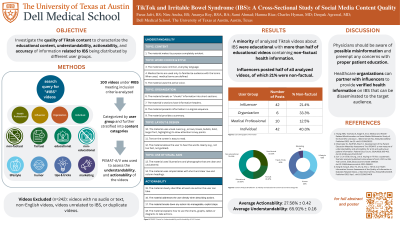Back


Poster Session B - Monday Morning
Category: Functional Bowel Disease
B0273 - TikTok and Irritable Bowel Syndrome (IBS): A Cross-Sectional Study of Social Media Content Quality
Monday, October 24, 2022
10:00 AM – 12:00 PM ET
Location: Crown Ballroom

Has Audio

Faraz Jafri, BS
Dell Medical School
Austin, TX
Presenting Author(s)
Faraz Jafri, BS1, Nirupama Ancha, BBA2, Ananya Roy, BA, BSA1, Sami Ahmad, 3, Hamna Riaz, 3, Charles Hyman, MD1, Deepak Agrawal, MD, MPH, MBA1
1Dell Medical School, Austin, TX; 2Dell Medical School at the University of Texas at Austin, Austin, TX; 3University of Texas at Austin, Austin, TX
Introduction: Social media has increasingly become the main platform individuals and medical professionals use to share their lived experience with medical conditions along with health advice. User-generated content about irritable bowel syndrome (IBS) is among the most popular health topics on the video-sharing social media platform TikTok. We sought to investigate the quality of Tiktok content to characterize the educational content and accuracy of information related to IBS being distributed.
Methods: The first 100 videos meeting inclusion criteria under the hashtag #IBS were thematically analyzed by two independent reviewers for source, number of views, intent and content. The source or entity posting the video was categorized as an influencer, lay individual or medical professional. The intent was classified as educational, factual and content categories included comedy, lifestyle and acceptability, marketing, and medical advice. The overall quality, understandability and actionability of the video was assessed using The Patient Education Materials Assessment Tool for Audiovisual Materials (PEMAT-A/V) and Journal of American Medical Association (JAMA) benchmark criteria, understandability, and actionability of the videos.
Results: Across all videos meeting inclusion criteria, 42% (n = 42) of videos were posted by social media influencers compared to 10% (n = 10) posted by medical professionals. Of the 30% (n = 30) of videos rated as educational, 47% (n = 14) were determined to be factual. A vast majority (97%) of the non-educational videos (n = 68) were posted by non-medical professionals. Content posted by influencers had a higher average number of shares (16,382, SD 25,673) compared to content by medical professionals (10,869, SD 19,488). In contrast, the average number of views was higher among medical professionals (3,661,000, SD 3,807,115) compared to videos posted by influencers (2,926,476, SD 2,874,250). The most common themes discussed in IBS videos included lifestyle/acceptability (43%, n = 43) and health advice (40%, n = 40).
Discussion: Almost half of the TikTok videos about IBS are posted by influencers and have poor educational content. Content posted by influencers was more likely to be shared while medical professionals garnered more average views. These findings support the partnership of healthcare organizations and professionals with influencers to increase health information sharing and dissemination of factual educational content.
Disclosures:
Faraz Jafri, BS1, Nirupama Ancha, BBA2, Ananya Roy, BA, BSA1, Sami Ahmad, 3, Hamna Riaz, 3, Charles Hyman, MD1, Deepak Agrawal, MD, MPH, MBA1. B0273 - TikTok and Irritable Bowel Syndrome (IBS): A Cross-Sectional Study of Social Media Content Quality, ACG 2022 Annual Scientific Meeting Abstracts. Charlotte, NC: American College of Gastroenterology.
1Dell Medical School, Austin, TX; 2Dell Medical School at the University of Texas at Austin, Austin, TX; 3University of Texas at Austin, Austin, TX
Introduction: Social media has increasingly become the main platform individuals and medical professionals use to share their lived experience with medical conditions along with health advice. User-generated content about irritable bowel syndrome (IBS) is among the most popular health topics on the video-sharing social media platform TikTok. We sought to investigate the quality of Tiktok content to characterize the educational content and accuracy of information related to IBS being distributed.
Methods: The first 100 videos meeting inclusion criteria under the hashtag #IBS were thematically analyzed by two independent reviewers for source, number of views, intent and content. The source or entity posting the video was categorized as an influencer, lay individual or medical professional. The intent was classified as educational, factual and content categories included comedy, lifestyle and acceptability, marketing, and medical advice. The overall quality, understandability and actionability of the video was assessed using The Patient Education Materials Assessment Tool for Audiovisual Materials (PEMAT-A/V) and Journal of American Medical Association (JAMA) benchmark criteria, understandability, and actionability of the videos.
Results: Across all videos meeting inclusion criteria, 42% (n = 42) of videos were posted by social media influencers compared to 10% (n = 10) posted by medical professionals. Of the 30% (n = 30) of videos rated as educational, 47% (n = 14) were determined to be factual. A vast majority (97%) of the non-educational videos (n = 68) were posted by non-medical professionals. Content posted by influencers had a higher average number of shares (16,382, SD 25,673) compared to content by medical professionals (10,869, SD 19,488). In contrast, the average number of views was higher among medical professionals (3,661,000, SD 3,807,115) compared to videos posted by influencers (2,926,476, SD 2,874,250). The most common themes discussed in IBS videos included lifestyle/acceptability (43%, n = 43) and health advice (40%, n = 40).
Discussion: Almost half of the TikTok videos about IBS are posted by influencers and have poor educational content. Content posted by influencers was more likely to be shared while medical professionals garnered more average views. These findings support the partnership of healthcare organizations and professionals with influencers to increase health information sharing and dissemination of factual educational content.
Disclosures:
Faraz Jafri indicated no relevant financial relationships.
Nirupama Ancha indicated no relevant financial relationships.
Ananya Roy indicated no relevant financial relationships.
Sami Ahmad indicated no relevant financial relationships.
Hamna Riaz indicated no relevant financial relationships.
Charles Hyman indicated no relevant financial relationships.
Deepak Agrawal indicated no relevant financial relationships.
Faraz Jafri, BS1, Nirupama Ancha, BBA2, Ananya Roy, BA, BSA1, Sami Ahmad, 3, Hamna Riaz, 3, Charles Hyman, MD1, Deepak Agrawal, MD, MPH, MBA1. B0273 - TikTok and Irritable Bowel Syndrome (IBS): A Cross-Sectional Study of Social Media Content Quality, ACG 2022 Annual Scientific Meeting Abstracts. Charlotte, NC: American College of Gastroenterology.

